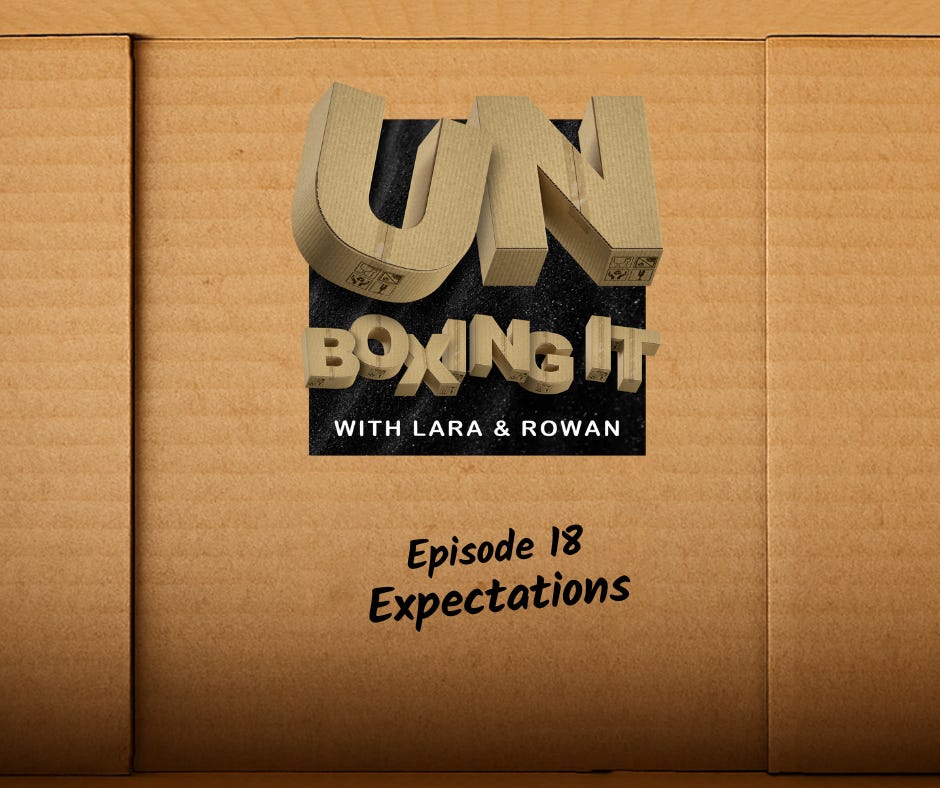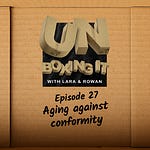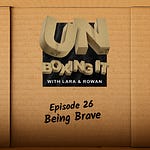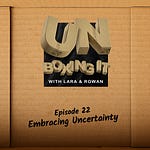“If I was a good person, I would—”
“If you cared about me, you would—”
“As adults, we should—”
“In the workplace, we need to—”
Um, says who?
Like it or not, enumerable expectations are built into the fabric of society. What we expect of ourselves and others plays a profound role in shaping our relationship to the world and those around us.
But who came up with these social rules, anyway? And why do we follow them? Are they fair? Do the expectations we’ve come to believe in improve our lives or do they create unnecessary anxiety, resentment or disappointment?
In this week’s episode, we dig into why we have these sets of rules and guidelines, which ones to keep and which ones we might want joyfully yeet into the sun.
If we missed some big ones, let us know! We’d love to do a follow-up episode. (Complaining about expectations is one of Rowan’s favourite activities on account of getting old.)
Want more of Lara and Rowan?
Rowan is available for speaking engagements, and Lara has coaching spots available.
Transcript
Lara: I think there's the part where. We think about what expectations have been put on us and how we want to deal with it and what we can and can't change in the moment.
But the other part is what expectations have you put on other people and how is that impacting their lives? And how is it impacting your life? Welcome to unboxing it. I'm Lara.
[00:00:43] Rowan: And I'm Rowan.
[00:00:44] Lara: And today we're gonna talk about a thing that I decided to make a good topic when listening to somebody else's podcast. and you know, I don't even remember what they said in the podcast, but what I really got out of it is that people have a lot of expectations about their life.
What it's gonna look like, what people are supposed to do, what would make you a good parent? What would make you a good friend? Like there's a lot of things that people have decided are very much the right thing to do, and now. That is just the expectation, and I think expectations can be good, but a lot of time they can be really a good way to set yourself up for disappointment and frustration, and also to set yourself up to go down paths that you don't need to go down.
I would agree as somebody who held myself to what I thought were the expectations of society. Placed upon me to the point where it was like, I know I'm not a girl. But society tells me that I'm a girl, so I guess I have to be a girl. Okay. And now I have to, have to fall in love with and marry a man.
And okay, what does that mean? I guess I have to find a man that I can be attracted to. 'cause I wasn't attracted to men.
Mm-hmm.
[00:02:08] Rowan: And it just kind of went on from there. Right. And so, spent a long time in my life trying to align. What I was doing with what I thought everybody else wanted and and that's an incredibly destructive thing.
Unhelpful and doesn't really serve a purpose other than to perhaps make other people more comfortable.
[00:02:33] Lara: Yes. I mean, this comes around to the whole. Thing that I believe, which is a lot of what we are taught to expect and to want and how we're supposed to do life is really designed to make some people happy and content right?
Like when we follow the rules and do what they want, they have the life and society they want, and we never really spent any time thinking about what we wanted and choosing for ourselves.
[00:03:02] Rowan: I think it goes back to childhood where, you know, even really early, like, and I don't wanna get stuck on like gender or sexual orientation.
Like there's so many expectations that we place on ourselves and others all, all throughout society. But a really easy one for me is. You know, when I had my son, my first son, and I would bring him around, and even when he was a baby, people were like, there'd be another baby.
I would say a little girl around. I was like, oh, do you have a little girlfriend? Do you have a girlfriend? You know, or like, he'd come home from school and, you know, somebody, you know, a neighbor , would see him and, you know, might say something like, oh, any girls that you like, you know, so the expectation was.
He is supposed to enter a relationship with a girl. He's supposed to find girls attractive. It's like drilled into him from a really early age. As it turns out, he does find girls attractive, but what if he didn't? And that was the expectation. You know, , and he's being told that that is something that he's supposed to feel that he's supposed to do, right?
Like, oh, do you have a little girlfriend? Oh, maybe you'll get married one day. You know? And it's like, so now the expectation is you find a girl and then you get married to her, and it just goes on from there. Like, when are you having children? When, not if. Do you want children or anything along those lines?
When are you two planning on having kids? It just grows out. , It's this constant assumption that we all want a specific life.
[00:04:38] Lara: Yeah. And that they talk to your baby and they're like, if it's a girl, like she's so pretty. She's so beautiful. And if they're a little boy, they'll be like, oh, he's so strong.
Like, just like there's so many things and some of us don't even realize we're doing it. I think a lot of people don't realize like that they haven't thought this through. It's just like what things are supposed to be, and I really think challenging that is important because. Not everybody needs to do the same thing.
Not everybody needs to want the same thing. Another example is my daughter who's in high school, who has said to me multiple times, I don't know why. Starting in like grade seven, they're like, what do you wanna do for your whole life? how am I supposed to know what I wanna do for my whole life right now?
And I agree wholeheartedly, but I know for a fact that there are a lot of other parents out there being like, well, you should be a lawyer. If you wanna be successful, you should be a doctor, right? There are a lot of people who set really high expectations for their children of what success is, and they'll be really disappointed if their children don't live up to that.
And then the children take that on as if it's their own without ever having really considered what they really want.
[00:05:55] Rowan: My stepdaughter was applying for a very prestigious. Program at one of the top universities here in Canada. And she went with her mom to go to the interview. 'cause there's a whole interview process to get in.
And her mom, my partner was just like, if you want this, I support you and I'm gonna drive you to the interview and we'll also have lunch and I'm gonna cheer you on the whole way. And they met a handful of other families and it did not feel that way. My partner said it was very much, like the parents were putting a lot of pressure on this child to get into this program because it would mean being very successful probably in that particular field going forward.
So my stepdaughter did get in, which is really cool. And then she did this really amazing thing. She decided all on her own that she wasn't gonna go to that program. She decided to take another program. At another university that offered more of a university experience. The one that she was going to was going to be a satellite program, so it was not in a big city, it was in a small town.
only university students would be the ones in her direct programs. You've got maybe 150, 200 young people in this program and there's not really a lot to do. There are no clubs to join, that sort of thing. So she was like, that sounds miserable. I don't wanna do that. I wanna have the university experience.
I'm gonna go to this program instead. Big campus. My friend is going, you know, we'll be roommates. And there was no disappointment in my partner's face when she heard this. She was so proud of her daughter for making a choice that worked for her. And I thought, how difficult would it be if we accepted just on the expectations alone when it comes to parenting, if we accepted that our children are not meant to be mini versions of our hopes and dreams.
They're not meant to fulfill our hopes and dreams for them. Their job is to fulfill the hopes and dreams that they want. And our job is to help them get there.
[00:08:14] Lara: Mm-hmm.
And to help them learn to figure out what that is, because I think a lot of people don't even know how to connect to what they want.
Like I really believe that to be true. I want to learn more. In fact, at some point about how to help people figure that out. I am very lucky. I. Quite easily know what I want, do you know what I mean? Like I know most of the time anyway, what I want. It's not something that I have to go searching for.
I might need to go searching for whether it's the right choice. I may need to go searching for how to do it, but I have a lot of, ability to just come up with what I want and all of that. A lot of people don't even know how to do that, and so I think teaching them beyond just.
Your skills say that you would make an excellent librarian. Right? Which is what like these tests do. I feel like when I was in high school, people would do these tests to be like, what careers would you be good at? And so many of the jobs that people would get where ones you don't know anybody who does that.
what is this? Right? You don't need to. Simply answer a questionnaire and suddenly be told what you can be. What I think we all need to do more of is learn how to ask ourselves questions about what we think we're good at and what we like to do and what that could mean. I'm about to go on this whole tangent, hang on a second.
and how that can mean. We want a certain thing, but also like who I was in high school and who I am now are unrecognizable to me. Like the differences, what I would have wanted then and what I want now, so different. Which is why I keep pivoting my career all over the place and again, maybe that's not true for everybody, but there's a lot of people like why would you know, at 14 years old.
What it is that you are going to want to do as a career, as an adult you're not fully formed yet, Why would you know? And then that sets people up for going into post-secondary spending like 12 years getting the degree to get to the place that they wanted to get to because that's what they decided when they were 14.
And then you feel like you can't not do that because you just spent 12 years doing it.
[00:10:30] Rowan: Yeah, exactly.
Let's talk
about why we subscribe to these expectations in the first place, because I think some people are able to go, yeah, okay, I can see that I'm doing things that maybe I don't really wanna be doing.
Or I am expecting things of people that maybe I shouldn't, but why? Why is that a thing that we do? And I think it really comes down to social contracts.
Right.
So social contracts sort of help keep a society cohesive. And so if we all agree on certain rules, then the idea is we can all live within those rules more or less harmoniously.
[00:11:24] Lara: Mm-hmm.
[00:11:25] Rowan: But it goes deeper than that because it's also about interpersonal relationships, right? Like what do you think as a coach, some of the obstacles are when it comes to define. The expectations that people have of you?
[00:11:41] Lara: Oh gosh. People are scared. I mean,
understandably, it's scary to go outside of what you have been told your whole life is what you're supposed to want. right off the bat. I work mostly with small business owners and right off the bat, small business owners have already gone off the path of what most people consider, to be the way we're supposed to do and get a career. But it's a constant, what should I do?
What am I supposed to do? And it's really hard to break away and think it's okay if I just. Do it the way I want to do it. It's okay if I'm not doing things the way other people would've done it, but I'm doing it the way I want to do it. And I think all of it comes around to perfectionism and sort of the idea that what we've been told is the ideal must be right.
It's like we're taking it on faith that what society has told us is the perfect life. Is the perfect life. Therefore we should want it, whether it's, you know, a spouse and children and a house and a car and, whatever it is. That that is what we should want because clearly somebody, it's like, well, they must have done the research.
They've looked into this, they know this is the right and best thing, but , oh, it's not because, and this is gonna, , lead back into some of our past episodes. everybody's different. Not everybody wants the same thing. Not everybody cares about the same things. It's shocking, right?
[00:13:13] Rowan: You see this a lot in, faith-based communities, and I'm not here to bash faith-based communities. I think they can be really wonderful and uplifting and supportive depending on the, belief, the community around it, et cetera. But I was raised Catholic. And in my Catholic upbringing, the expectations were very, very clear.
You are straight. You follow certain guidelines when it comes to the gender you were assigned at birth. You definitely want children. You should have children. And if you don't have children, it's because you can't have children, and then you should be going out of your way to find a way to have children like adopting them, for example, it was very, very clear what the guidelines were.
And I think that those rules, those expectations, they work really well for some people. Some people really want that life. And I wasn't mad about getting married and having children. I wanted to get married and have children, not necessarily the way that I did, but I could find happiness there. and I certainly.
Love my kids, and I'm so glad that I had them I always wanted , to be a parent. I specifically wanted to be a dad. but I also think that there was a sadness because I had it all in some ways. I bought a home. I was married at 20 with a child. Bought a home at 22,, had my tidy little house in the suburbs with my little gardens and, you know, and, raised my kids.
And there was a part of it that always felt wrong. I was like, I have everything. Everything's right here. So what is it that's missing? And what was missing was I was playing a role in society, the role of a woman. That did not fit me, and I knew, and this is why I buried it so deep down, even from myself, most of the time whenever it came up, I'd push it back down.
and the other issue of course, is that at the time you know, I thought I was married to a man. And so,there was a lack of attraction there in that sense. And I knew that this life would be perfect for me if only there were some changes to who I was and to who I was married to. But the idea of stepping outside of that was terrifying because what would that mean? I mean, it would mean that we weren't going to church at that point. . Like I don't consider myself Catholic today. and so we weren't raising our children , in a faith-based, situation, but.
I have family who are Catholic. I have friends who are deeply religious. I had, you know, all these things. So it was like what does that mean if we do change things around? What if I came out, like if I came out, what would that do? And then what would that do to my children?
And then would my children have friends? Like I just kept following it down, , are my children's friends' parents, would they be okay with that? And it just kept going. And so I think sometimes. We get stuck so deeply in the fear, like you were saying, that fear of stepping outside of the box.
Because the risk is real. The risk is, and it's, higher for some people than it is for others. If you live in a big city and your circle's largely accepting, you can make some changes and they're probably gonna be okay with it. But then, there are other areas where it's like everybody kind of does the same thing.
And the minute that you don't, wow, do you stick out and you don't necessarily stick out in a good way. And then what? Then your whole life becomes. Worrying about what other people are thinking, what they're saying, whether or not you're going to feel safe, where you live, and that, those are the big things, obviously.
I mean that, like coming out for example, that's, it shouldn't be a big thing, but it is a big thing. , In this day and age still, you know, but even changing careers, if you are an engineer, but you want to be a sculptor. The idea, you're like, I think I wanna do this full time.
Your engineering friends are probably going to think you're crazy, right? . You know, because why would you leave a good job, say like a six figure job to go be a sculptor? So I think there's a lot of these times when we don't take the leap because we're so, so deeply afraid.
[00:17:40] Lara: Yeah, and afraid of two parts. So let's take the sculptor for example. If I decide I wanna go be a sculptor, number one, other people will be like, what? But you like went to school for all those years. Why are you destroying an amazing career for something that's, not going to be? Very good, or it's going to be hard, like , you're making a weird choice that I don't like.
Right. You people are gonna think that. There's also the piece where you're like, I'm gonna make so much less money, probably, at least in the beginning. And is that a smart choice? Right? There's so many things that come up. So I wanna back up because I think this comes back to a couple of different things.
One, I think we've all been taught to try to fit in. More than we've been taught to find places we belong. And so when you're trying to fit in, you're trying to be what you think people want you to be and trying to fit in is not what I think people should be doing. It's what I thought. People should be doing for a very long time.
It's what I was trying to do for a very long time to try to fit in so that you feel accepted and so like you feel like you've done the right thing, but trying to belong means that you're just gonna go find the right people where you feel good. And those are
very different things, but that's not what we're taught to do.
The other piece is, when you're talking about
those societal expectations. Our go-to reaction is to fix ourselves so that we can want that. Right? So what do I have to do to fix myself so that I can get on board with the right thing?
[00:19:18] Rowan: Right? Like it's something that you are like, like it's a fault on your end for not wanting it.
It's like there's something broken inside of you for not wanting that thing.
[00:19:27] Lara: Exactly. And it's because. Deciding to do something different could blow up a lot of your life. it's just so multifaceted, right? So, one, am I gonna blow up my life? Am I gonna wreck everybody else's life by trying to be who I wanna be?
Or by doing things differently or by challenging the world? Or do I wanna just fit in, be quiet, and just try to do my best at life? And so it feels. Like something scary and dangerous and maybe selfish to decide that you wanna change the way the world works, which is not really what you're doing, but it could be what it feels like.
[00:20:06] Rowan: Yeah. Yeah. And I also wanna say that there is, an ambiguity to this a little bit too. So I don't know a lot of people. Who are living the dream life that they wanted to live. Exactly.
[00:20:23] Lara: Mm-hmm.
[00:20:24] Rowan: There are people who are following their dreams. Maybe it takes a little longer. I'm opening a coffee shop, for example, and now I get to, grow beard where I didn't get to grow a beard before.
So I mean, like, , you know, things are happening for me in the right direction, which is wonderful, but
I also think that there. Can be an acceptance that life is never going to look exactly like you dreamed it to be.
So you can have the expectation of following your dreams or,living more authentically. While also accepting that some parts maybe you can't change.
Maybe you've already made decisions. Maybe you can't leave your job right now. Or maybe, I don't know. I'm just trying to think of like different things, but like, maybe you don't live exactly where you wanna live because it's just not possible to live there.
But I think that you can find joy in that too. So it's, okay to change what you can change and maybe not change everything. I don't wanna give this impression because I think there's a privilege to that, to be able to say oh yeah, you can just blow everything up if you want to. And it's totally fine.
Not for everyone. Not for everyone, right? Some people, if they come out, if they quit their job, it can put them in a very dire situation. So I think it's all right to say, in an ideal world, we would all be able to blow those expectations out of the water and just go, yeah, whatever, screw it.
but , for some of us, maybe it's just little baby steps. Maybe there's just little smaller things we can do that are more in line with. Where we wanna go, or maybe the plan is longer. Maybe there's a five year plan, a 10 year plan to get to where we want to be. I know somebody, for example, who is , a trans woman, and she did not feel she could come out before she retired.
She knew for years and years and years that she was a woman, but also knew that in her company. At the time, there were no protections for trans people in the country at her company. It was not a very tolerant place, and that if she wanted to be able to pay off her mortgage, she wanted to be able to retire comfortably.
She needed to keep doing that. Is that a choice I would make? I don't know. Do I understand that's a choice that she felt she needed to make? Absolutely. And when she did retire, she retired early. When she did retire, she had the security to come out as herself and transition the way that she wanted to transition and be financially secure for the rest of her life.
So she played the expectation game for a while and now she gets to live as herself. You know, , again, there's an ambiguity.
[00:23:14] Lara: Yeah. So I think there's the part where. We think about what expectations have been put on us and how we want to deal with it and what we can and can't change in the moment.
But the other part is what expectations have you put on other people and how is that impacting their lives? And how is it impacting your life? Because if you expect somebody else to lead a certain kind of life, for you to be able to have the life you want, like that's number one. Too much pressure for a person, but also if that person, whatever expectation you might have, does anything different and like, it's just like now you are terrified or maybe you're not terrified until it happens.
'cause you were so sure it was gonna happen. , Now I'm not gonna have the life I wanted. 'cause I wanted to be a grandparent because I wanted to. I can't think of another example off the top of my head, but I am remembering now that the reason I made this suggestion was during that podcast, it was somebody who had very, very distinct expectations for how their child was going to do academically in school, right?
Like, I need you to have good grades. and even when they were talking about it, they were accepting that maybe their kid wouldn't have good grades, but in a way. And I don't think that they realized this, but what I was getting was in a way that was like, I have to accept that this kid is not going to be as successful as I thought, and I am learning to be okay with that.
Versus the only way
for a kid to be successful is to have high grades.
[00:24:49] Rowan: Yeah.
and that's fear talking, right? I'm sure. Maybe you have seen people who did not get high grades or maybe you yourself did not get high grades and you're not. Succeeding or those people are not succeeding the way that you interpret success.
So maybe they're not making a lot of money. Maybe they're really struggling in various areas of their lives. Maybe , you don't have a plan for retirement, whatever it might be. So in the parent's mind. You know, my child must be a straight A student, must get really good grades. They can get into a really good school so that they can get a really good degree.
So they can get a really good job. Right. I'm just trying to set them up for success and. That might not be the child that you have. I have two children who did not finish high school. I've talked about this before . Who are both successful in their own rights. One of them ended up going to college as a mature student.
One of them is following a music career right now, and they're both doing quite well. It's just not in the way that perhaps is the norm. Right. I think. The other thing that I've seen, and I actually subscribed to this for a while too, before one of my children came out as trans, I thought I had three boys.
Also at the time was identifying as a woman. So I subscribed the whole hashtag boy, mom, mom of boys thing, right? And like, you see this happen over and over where? parents will take on the identity of their children. Now, if you're not a parent, you're listening to this, keep listening because this doesn't just apply to parents.
This is an expectation. that parents of adult children have as well, right? this, idea that like if I have a child of a certain gender, I will have these experiences with that child. So there's this idea of like, oh, I have a son. He's gonna play lots of sports. None of the children I, I, thought were my three boys.
Are sporty, including the two who are actually boys. They don't like sports, none of them. I didn't actually have that expectation, but what I'm saying is that a lot of people would or the idea that, you know, I, I remember when I found out that the last child that I gave birth to was a boy, and the other two I still thought were boys.
A family member found out and she gave me this big hug and told me how sorry she was
[00:27:24] Lara: Aw.
[00:27:25] Rowan: Yeah, , she was very sorry for me that I would never have a daughter because having daughters is wonderful and I thought, what about having daughters is wonderful? Specifically, like what specifically do you have with all daughters?
Because I don't think that's true either, right? This idea that your daughter will get married one day and you will go dress shopping with her, or that you will be there when she inevitably gives birth to your grandchild or whatever it might be, you don't know what path that child is going to take. Just like all three of the children who I assumed were my sons one, it turns out, is not a son.
Took wildly different paths in life. All of their lives look incredibly different than the life that, you know, in my head, I thought they were going to lead based on their gender.
[00:28:19] Lara: And just probably just based on what it is that kids are supposed to do and whatever generation you live in, right?
Like there are certain expectations that I think are changing right now. So maybe the millennials, younger millennials having children might have a. Totally different expectation of what their kids should be like, but the expectations that you are going, and I don't wanna just focus on parenting, but like, I think that it changes by generation.
And I think that it also impacts your expectations of what a good employee is, your expectations of what a good friend is. The expectations that are out there for a lot of. Employees is that if they really care about their job, they would put in more than was asked of them. Now you're working hard, like you're bringing your work home, you're impressive.
And therefore, that's what you think you should do. And therefore you're going to convince yourself that that's what you'd like to do because you're a dedicated, hardworking person and that's who you wanna be. I'm not saying nobody actually wants any of the things that the expectations are tied to.
All I'm saying is there is an opportunity for all of us to ask ourselves, do we have expectations for ourselves and for other people that are simply part of the societal expectations. We never really spent time thinking about.
[00:29:42] Rowan: I also think that if you look at various cultures around the world today.
There are some similarities in expectations, and there are some big differences in expectations. an expectation here in North America for most families is that we do not have multi-generational living. Our parents live separately from us. Our children will grow up and live separately from us.
Right. That's always the way , that we were taught. Things are supposed to be, but then you go to some other cultures. Where it is the expectation that your parents will continue to live with you and now you'll support them instead of them supporting you because they're getting older and they will help you with the children as much as they can.
And you all live in one home.
Right. And that's the expectation. So, if you look throughout just history, the expectations of. People and families and everything have changed right down to, it used to be that families all slept in the same bed and now children sleep in their own rooms.
Right? And, and not even usually rooms that they share completely separate rooms. Everybody gets their own space, so it's okay to question expectations. The only reason a lot of these things changed is because. We questioned the expectation, various people asked if these things really worked for them or the people around them, and then gradually those changes were made to the point where the societal expectation became the new thing.
So. They don't have to be rigid. We don't have to be rigid in our thinking. Here it is. Okay. And actually very human and healthy to push back against expectations that are not working. That is how we grow as individuals and it's how we grow as societies.
[00:31:41] Lara: If anybody listening has any people or tools that they've found that really help people explore what it is that they want and whether or not they wanna change anything, please come and share those with us.
I would love to hear about it because I think, , it's definitely still a work in progress for me. It's a work in progress for figuring myself out and for the supporting that I do of other people. But I do think what's key is it's okay. To not do what's always been thought was the right thing to do.
And it's okay to sort of mess with things. And I think that if we don't have people who do that, like we need people who are going to, sometimes it's innovate, sometimes it's, you know, disruptors, but we need that in the world. It's not a bad thing
to not go with the status quo.
[00:32:32] Rowan: Agreed.
[00:32:32] Lara: I think that this is a really good discussion about expectations. I think that
We can have expectations, but just don't assume. What you've always thought is the right thing to think and let yourself challenge your beliefs and think about different options
[00:32:48] Rowan: and have really honest conversations with the people you care about.
About what they want. What do they want for their lives? What do their lives actually look like? Is the person who isn't replying to your text, for two or three days because they don't care about you? Or is it because they have a lot going on right now? Or is it because that is way down the priority list for them right now because they're using less screen time?
I mean, who knows, right? So I think having these expectations. Set us up for disappointment can be changed with some healthy communication sometimes.
[00:33:26] Lara: Agreed. Alright, this is a good topic. Again, please comment, share your ideas. The more I get feedback from people. The more I'm happy, which is, you know, that's just for me.
But also it helps us come up with more topics. Come subscribe to our substack and thank you. Thank you to all of those who have become paid subscribers, because that really does help us be able to do more of this.
[00:33:50] Rowan: It sure does. Thank you so much.














